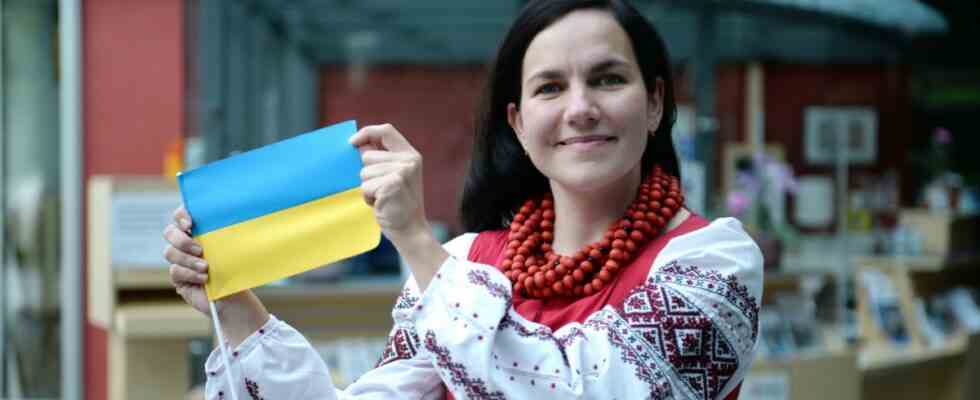Early March 2022: Anna Lahdyuk, her husband Vasyl and their then ten-month-old son of the same name live on the ninth floor of a high-rise building in a residential area in the western Ukrainian city of Lviv. It’s war. The Russians have fired rockets at the former Lemberg several times, and there are constant bomb alarms. The young family and Labrador Bailey then have to rush nine floors down into the shelter, often several times a day, with the mother in her arms. On March 12, low-flying military planes cross the city. Anna and her husband have no way of knowing that Polish planes are picking up refugees. They’re just afraid: “We thought it was time to start. That’s when we realized we couldn’t stay here,” says the 34-year-old. “My husband said he wanted to stay and defend the country, I should flee to friends in Germany with Vasyl.”
With a suitcase, rucksack and buggy, it’s a little later to the Hungarian border, 300 kilometers away. There the young family separates. Anna and her baby are picked up by friends from Germering. The Ukrainians who have lived in Bavaria for a long time “always told us that we could come”. Her husband Vasyl reports for military training, which he will soon complete. Anna and the little one are initially accommodated in Germering. Today the two live in an apartment rented by the municipality of Planegg, two of around 200 Ukrainian refugees in Planegg and Martinsried alone. Anna works part-time at City Hall. As a “carer” she continues the job of the former Planegger chamberlain Peter Vogel and helps her compatriots in all possible areas, especially when looking for an apartment.
The young woman is ideally suited for this. She speaks German and is getting better at it every day. She is lively, eloquent and always has a friendly smile on her face. For many refugees – almost exclusively women and mothers with children – Anna Lahdyuk is not only a point of contact, but often also something like a therapist. She studied, she is a geomorphologist. After her studies, she worked as a tour guide for twelve years and often went on cultural trips in Germany and in many European countries. It goes without saying that she sees herself as a European. She speaks English, a little French, German and Italian. She says that she was kindly received by her friends and the area. She soon found more friends. At first she couldn’t find a place for her little one, for herself it was always clear that she wanted to work.
Twelve job interviews in a short time
After a few weeks, Lahdyuk started applying, she moved to Graefelfing with a German family for a few weeks. She sent dozens of applications to hotels, to the town halls in the area, and also to Planegg. She conducted twelve job interviews in a short space of time and immediately liked Planegg: “The Würm flows here. I knew about the Würm Ice Age from my studies.” Your conversation with the personnel administration in the town hall was well received, the previous caretaker Peter Vogel is just retiring, Anna came at the right time. She found a childcare place for her son, “that was the most important thing to me”. And she threw herself into the work, got her own room in the town hall and was technically well equipped. Help comes from all over the town hall, Planegg’s press officer Kiki Xander stands by the young woman’s side.
Lviv in western Ukraine is also repeatedly subject to air raids. Like in mid-April when clouds of smoke rose.
(Photo: Matthew Hatcher/dpa)
From day one, “my compatriots came with all kinds of questions,” and the phone kept ringing. Anna Lahdyuk is happy: “I’m away from the war, I’m safe with Vasyl. It’s a big task for me to help my compatriots.” The municipality rents apartments and houses on the private market, and the caretaker ensures sensible accommodation: five semi-families, women with children, could be accommodated in Thürheimstrasse, as well as in Röntgenstrasse in Martinsried. The district office cooperates, the rent is usually paid by the job center. The fugitives and their families are also looking in other regions: Oberammergau, Augsburg, and even a family is moving to Brandenburg. The Asylum Helpers’ Group actively supports the caretaker, as does the Würmtal-Island welfare center: “At first I was afraid of the task,” says the Ukrainian, “but I have so many supporters. Everyone works together.”
The young woman from Ukraine is full of gratitude: “I have strong feelings as a mother, I have to protect my child, in Lviv the little one sat crying in the basement, here he is safe.” She is overwhelmed by the friendliness and helpfulness of the Germans and says: “I am neither alone nor isolated here. I experience great solidarity.” Everything is “well organized”, only: “A little too much paper, too much to write.” She is unsure about her future: “I don’t know if I want to go back, but of course I want to be at home.” She calls her husband via video every three days. And she hopes that he will get a few days off after his training. Then of course she wants to go to him: “I have hope to get through it all.”

